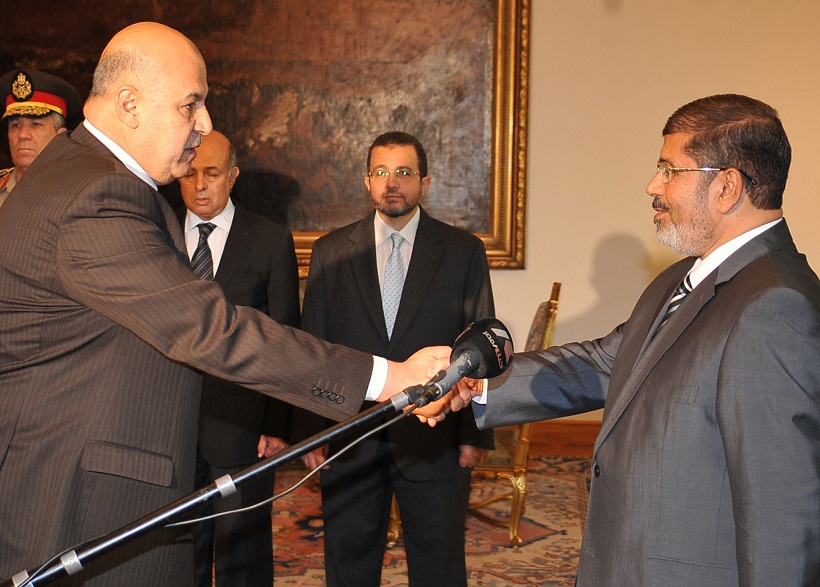BAGHDAD: Iraqis defied waves of bomb, mortar and rocket attacks that killed 24 people to turn out Sunday in huge numbers to vote in elections seen as a test of the war-shattered state’s fragile democracy.
AFP correspondents said long queues formed at polling stations in the capital, in Sunni towns that mostly boycotted the last parliamentary vote in 2005, and in other centers across the conflict-ridden country.
Baghdad bore the brunt of the violence, with around 70 mortars raining down on mostly Sunni areas as people voted in the second parliamentary ballot since US-led forces ousted dictator Saddam Hussein in 2003.
The cities of Fallujah, Baquba, Samarra and several other areas were also hit by mortar rounds or bombs, many of them exploding near polling stations.
An Al-Qaeda group, which sees the election as validating the Shia-led government and the US occupation, warned on Friday that anyone voting ran the risk of being attacked, heightening an already tense security situation.
Baghdad s streets were all but deserted of vehicles bar those ferrying thousands of police and soldiers, as people journeyed on foot to polling stations across the capital.
We don t care about the bombs. The people will vote, said Abbas Hussein, jangling a set of brown prayer beads with his index finger coated in thick purple ink, signaling he had voted earlier in Mansur, a Sunni district.
This is our fate, said 46-year-old English teacher Arabiya Al-Samarraie, as explosions echoed in the background and army helicopters flew overhead.
To us Iraqis, our future is unknown but today s bombs are nothing, said Samarraie at a polling station in Mansur, where she was working as an electoral official.
An interior ministry official said the violence, which came despite 200,000 police and soldiers deployed in Baghdad and hundreds of thousands more across the country of around 30 million people, had killed 24 people and wounded 80.
Prime Minister Nuri al-Maliki said the attacks are only noise to impress voters but Iraqis are a people who love challenges and you will see that this will not damage their morale.
Maliki voted in Baghdad s fortified Green Zone which earlier Sunday took several mortar hits.
Khaled Abdallah, 35, was one of the thousands who queued up in the Sunni bastion of Fallujah, once a hotbed of insurgency, to cast his ballot.
My vote today is a defiance of Al-Qaeda, he told AFP.
Sunni Arabs boycotted nationwide polls in 2005 in protest at the rise to power of the nation s long-oppressed Shia majority.
That boycott deepened the sectarian divide and heightened unrest which killed tens of thousands of Iraqis in the aftermath of the 2003 invasion and which has only eased in the past two years.
The election will usher in a government tasked with tackling a multitude of problems, including still high levels of violence, an economy in tatters and state ministries mired in a culture of endemic corruption.
Seven years after the war, much of Baghdad remains bomb-damaged, most homes receive only a few hours of mains electricity a day and lack clean drinking water, and a quarter of the Iraqi population is illiterate.
The United States hopes the election will bolster Iraq s democracy, making it a beacon in a region where free and fair elections are the exception, and pave the way to a smooth pullout of American troops.
Maliki, the Shia head of the State of Law Alliance, is bidding to become the first Iraqi voted back into office at the will of the people who for decades had no choice but Saddam s Baath Party.
His rivals include Iyad Allawi, a Shia former prime minister who heads the Iraqiya list, a rival secular coalition that has strong support in Sunni areas.
Also seeking the top job are Ahmed Chalabi, a former deputy premier once favored but now loathed by Washington; Adel Abdel-Mahdi, the country s Shia vice president; and Baqer Jaber Solagh, the finance minister.
Chalabi, Abdel-Mahdi and Solagh all represent the Iraq National Alliance, the main Shia religious list.
Under the Iraqi electoral system no one party will emerge with the 163 seats needed to form a government on their own and the ensuing horse-trading to form a governing coalition could take months.
Although violence is at a post-invasion low, attacks occur almost daily in Baghdad and other hotspots.
The Islamic State of Iraq, the Qaeda front in the country, on Friday said it was imposing a curfew on Sunday and anyone who dared defy it would expose himself to the anger of Allah and … all kinds of weapons of the mujahedeen.


